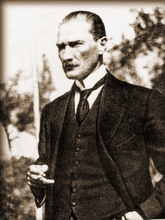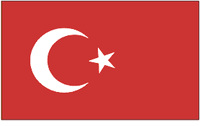I've been using Rosetta Stone to build my Turkish vocabulary. I've decided to reinforce some of those words here. This effort echoes a January post but with pictures this time.
Sunday, November 25, 2007
Tuesday, November 20, 2007
Bayram
Man, over 7 months! That's how long I've been away from my Turkish blog. Ouch! During this period, I've been preoccupied with my home renovations (as well as helping Mary with her home's maintenance). They've been very disruptive, to put it gently. You can read about it at my main blog.
In any event, I'm back. And starting with a blurb about bayram is fitting, as it's now holidays here in America. In fact, Christmas music is already being played on the radio even though Thanksgiving has not even occurred yet. Irritating—can we finish with one holiday first? Christmas, wait your turn! Stop trying to shove past Thanksgiving, the distinctly American holiday!
Historical footnote: New England's religious Pilgrims were not the first to usher in Thanksgiving. That honor goes to the secular settlers of Jamestown, Virgina. For more information, check this link out.
Back to bayram (bai-ram), which means "religious or national festival". Turkey has two religious bayrams. During both, it's customary for young people to visit older family members and friends and kiss their hands.
Note: My source for this information is lonely planet's Turkish phrasebook.
One is called Şeker Bayramı, the feast of the sweets, or Ramazan Bayramı, the feast of Ramadan. During the lunar month of Ramadan that precedes Ramazan Bayramı, Muslims fast during the day and feast at night for one month. At the end of the month, they celebrate this three-day bayram and public holiday, making sweets and visiting each other. Children also go from house to house wishing people Mutlu bayramlar (Happy Bayrams!) and receiving sweets, chocolate or money.
Shades of Halloween! Interesting surface similarities but, of course, the context is totally different.
During Kurban Bayramı, the feast of the sacrifice, the second bayram, people make animal sacrifices and give the meat to the poor and needy. This festival last for four days and is also a public holiday.
Ben Şeker Bayramı ile ilgileniyorum. Tatlı seviyorum. Güdülenme var. [Translation: I am interested in Şeker Bayramı. I like sweets. There's my motivation. :^) ]
In any event, I'm back. And starting with a blurb about bayram is fitting, as it's now holidays here in America. In fact, Christmas music is already being played on the radio even though Thanksgiving has not even occurred yet. Irritating—can we finish with one holiday first? Christmas, wait your turn! Stop trying to shove past Thanksgiving, the distinctly American holiday!
Historical footnote: New England's religious Pilgrims were not the first to usher in Thanksgiving. That honor goes to the secular settlers of Jamestown, Virgina. For more information, check this link out.
Back to bayram (bai-ram), which means "religious or national festival". Turkey has two religious bayrams. During both, it's customary for young people to visit older family members and friends and kiss their hands.
Note: My source for this information is lonely planet's Turkish phrasebook.
One is called Şeker Bayramı, the feast of the sweets, or Ramazan Bayramı, the feast of Ramadan. During the lunar month of Ramadan that precedes Ramazan Bayramı, Muslims fast during the day and feast at night for one month. At the end of the month, they celebrate this three-day bayram and public holiday, making sweets and visiting each other. Children also go from house to house wishing people Mutlu bayramlar (Happy Bayrams!) and receiving sweets, chocolate or money.
Shades of Halloween! Interesting surface similarities but, of course, the context is totally different.
During Kurban Bayramı, the feast of the sacrifice, the second bayram, people make animal sacrifices and give the meat to the poor and needy. This festival last for four days and is also a public holiday.
Ben Şeker Bayramı ile ilgileniyorum. Tatlı seviyorum. Güdülenme var. [Translation: I am interested in Şeker Bayramı. I like sweets. There's my motivation. :^) ]
Monday, April 9, 2007
Vowel Harmony
Since my body clock is out of whack (it's almost 2:00 AM my time and I am wide awake), I'm trying to use my time productively. So, staring at the screen, it dawned on me: "How many hits would I get with a Google search of 'vowel harmony'?" Lo and behold, I got well over 40,000!
Among them was this gem—http://www.turkishlanguage.co.uk/vh1.htm. Its explanation of Turkish vowel harmony is unlike others that I can recall. However, I'm still going with what sounds pleasing to my ear (welcoming corrections as I go along).
That's it for now. I'm going to try to sleep, perchance to dream.
Among them was this gem—http://www.turkishlanguage.co.uk/vh1.htm. Its explanation of Turkish vowel harmony is unlike others that I can recall. However, I'm still going with what sounds pleasing to my ear (welcoming corrections as I go along).
That's it for now. I'm going to try to sleep, perchance to dream.
Saturday, March 24, 2007
Lonely Planet Phrasebooks
At my local Borders, I stumbled across a Lonely Planet Phrasebook for Turkish.
So far, I like what I see. First, it's small enough to fit in my coat pocket, making it easy to keep it with me and open it up when I find a few moments alone. Second, it was cheap at $9.00. You can find it for less via the net. Third, it includes transliteration for many words.
For example, bira is Turkish for beer. The transliteration for bira is bee-ra. This little paperback covers enough words to reinforce the correct pronunciation of all the letters of the Turkish alphabet.
This phrasebook also touches on Turkish grammar. As such, it's reinforcing the grammar I've been studying via other textbooks. It's also clarifying some elements of grammar on which I've stumbled.
For example, it touches on Turkish as a case language, "which means that endings are added to nouns and pronouns to show their relationship to other elements in the sentence." Examples follow:
So far, I like what I see. First, it's small enough to fit in my coat pocket, making it easy to keep it with me and open it up when I find a few moments alone. Second, it was cheap at $9.00. You can find it for less via the net. Third, it includes transliteration for many words.
For example, bira is Turkish for beer. The transliteration for bira is bee-ra. This little paperback covers enough words to reinforce the correct pronunciation of all the letters of the Turkish alphabet.
This phrasebook also touches on Turkish grammar. As such, it's reinforcing the grammar I've been studying via other textbooks. It's also clarifying some elements of grammar on which I've stumbled.
For example, it touches on Turkish as a case language, "which means that endings are added to nouns and pronouns to show their relationship to other elements in the sentence." Examples follow:
nominative — shows the subject of the sentence: This bag is very heavy. Bu çanta çok ağır. (literally: this bag very heavy)
accusative — shows the object of the sentence: Did you see that bag? Şu çantayı gördün mü? (literally: that bag saw-you?
genetive — shows possession ("of"): The color of this bag is very nice. Bu çantanın rengi çok güzel. (literally: this bag-of color very nice)
dative — shows the indirect object with verbs like "happen" ('to'): What happened to your bag? Çantana ne oldu? (literally: bag-your-to what happened?
locative — shows location ("in", "on", "at", "with", etc.): It's her bag. Onun çantasında. (literally: her bag-in)
ablative — shows point of origin in space or time ("from"): He pulled the timetable from the bag. Tarifeyi çantasından çıkardı. (literally: timetable bag-his-from pulled)All in all, it's an interesting, afforable complement to my other textbooks.
Wednesday, March 7, 2007
Var ol!
I stumbled across this Turkish expression while browsing through www.turkishdictionary.net: Var ol! Good for you!/Well done!/Bravo!
That's a keeper.
That's a keeper.
Q & A 01
Workbook exercise: match the following questions and answers.
Answers:
| Question | Answer |
| a. O Hollandalı mı? | i. Adım Berkant. |
| b. Adınız ne? | ii. Dört kişiyiz. |
| c. Siz polissiniz, değil mi? | iii. Eşim Asuman. |
| d. Milliyetiniz ne? | iv. Hayır, doktorum. |
| e. Yoğurt var mı? | v. Hayır, saçlarım kısa. |
| f. Saçlarınız uzun mu? | vi. Hayır, Türk. |
| g. Eşiniz kim? | vii. Var, ama taze değil. |
| h. Oteliniz nasıl? | viii. Türküm. |
| i. Kaç Kişisiniz? | ix. Güzel ama pahalı. |
Answers:
- vi
- i
- iv
- viii
- vii
- v
- iii
- ix
- ii
| Question | Answer |
| a. Are you Dutch? | i. My name is Berkant. |
| b. What is your name? | ii. 4 people. |
| c. Are you a policeman? | iii. My husband is Asuman. |
| d. What is your nationality? | iv. No, I am a doctor. |
| e. Is that yoghurt? | v. No, my hair is short. |
| f. Is your hair long? | vi. No, Turk. |
| g. Who is your husband? | vii. There, but it's not fresh. |
| h. How is your hotel? | viii. I am a Turk. |
| i. How many people? | ix. Good but expensive. |
Tuesday, March 6, 2007
Possessive Names
Speaking of possessiveness, one of my Turkish/English dictionaries gave the following example of a possessive: Gülru (a woman's name); Gülru'nun (Gülru's).
This switched a light on for me. I had seen this form but didn't understand it. But, following a policy of the Little Prince, once I have a question, I never let it go. I just store it away for future reference.
Now, here's the answer from my textbook: "In written Turkish, proper names are usually separated from the suffix with an apostrophe, in order to avoid confusion."
Examples follow:
This switched a light on for me. I had seen this form but didn't understand it. But, following a policy of the Little Prince, once I have a question, I never let it go. I just store it away for future reference.
Now, here's the answer from my textbook: "In written Turkish, proper names are usually separated from the suffix with an apostrophe, in order to avoid confusion."
Examples follow:
- Ali'nin şapkası (Ali's hat)
- Adamın evi (the man's house)
- Adamların evi (the men's house)
- Hanımın kitapları (the lady's books)
If, in a combination of two nouns, the first noun is a modifier rather than a possessor, it does not take a separate suffix.Then, it cites some examples as follows:
- Ziraat (agriculture); banka (bank); but together Ziraat Bankası (the Agriculture Bank, the largest of the state-owned banks).
- Atatürk Havalimanı (the Atatürk Airport, in Istanbul).
- Üniversite (university); Anakara Üniversitesi (Anakara University)
Subscribe to:
Posts (Atom)











